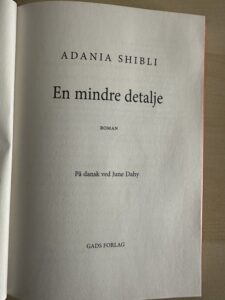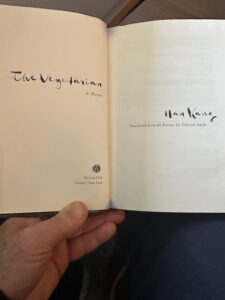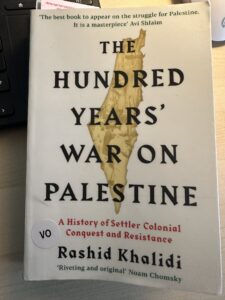
Amazing novel in two parts: the first took place in Negev after the Nakba war in 1948, and the horrible raping & killing of an Arab Bedouin girl by an Israeli soldier; the second part started in Ramallah by a Palestinian protagonist, a woman, who was born the same day as the killing of the Negev girl, was obsessed to follow the memorial traces of this girl, decades after the killing took place. The Novel is translated from Arabic to Danish by June Dahy, who’s translation leaves us with a lovely piece of literature, with its subtle smooth and rich Danish prose style.
The movement of the plot is slowly, heavy and sensational, covering almost half of the novella, but taking place only in very few days: from the 9th August to the 13th August 1949; while the second half covers the lengthy research of the narrator to find out what happened in those horrible few days where the Palestinian Bedouin girl was captured, raped and lately killed, buried in an unknown grave in the desert of Negev. This tortuous journey of the protagonist, who identify herself with the destiny of the murdered girl, covering a series of dangerous, risky movements from areas A to B to C – well known by Old South African Apartheid system, as well as every Palestinian living under occupation, whether a refugee living abroad, or citizen living in West Bank, Gaza, Jerusalem or Israel. The well- in – depth approach to the psychological ramifications of all thos personalities we met, in work, at checkpoints, where she met a girl who tried to sell her unneeded items, in kibbutz, in archival centres or else where, pushes the reader to the borders of looking in an Abyss, an Inferno, to know the results of the research that ends up in an unknown mystery of a burning flame in both hand & breast, paving the way to the piercing sound of a faraway bullet.
The book deserves reading now more than any time else. The killings of one Bedouin girl in Negev took place 77 years ago. The killings are continued in 2025, culminated in tens of thousands of Palestinian women & children, murdered intentionally, many still buried under rubbles, by the most sophisticated weaponry, with total complicity from most of the Worlds’ Super Powers; ending up in one of the longest fifteenth months of online ” plausible genocide” in the 21th century- as the Highest Court of the World, ICJ, warned. The novel never touched directly on the panoramic political view; on the contrary, it concentrated more on marginal and small details, in a Balzacian’s style: that what literature can do and achieve, depicting those small unseen details that any reader can identify with That what Shibli achieved in a wonderful and warm way, although heavy and tragic taste dominate most of the narrative.

